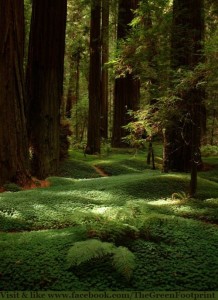Some things to consider about how we experience our world: our primary sense is visual, we make meaning out of our world through what we see and use the other senses to augment this, and walking upright means we focus our eyes in front of us and downwards so we don’t fall over things. Therefore, if I were looking for (visual reference) the best geography to live in I would goto somewhere warmish, flat, with an unobstructed view that was fertile and hosted a variety of flora and fauna. Mountainous terrain would be second because while it has great views it’s a tripping hazard waiting to happen. 🙂
 A forest is close to the last place I would want to be, ocean and or Death Valley competing for dead last, because it goes against our strengths. Dense flora from ground level all they way to the top of the tree story keep us from being able to see very far, filter the light so we can’t see very much of what is available to us, fills the ground with trippable opportunities, which keeps our eyes and head down while an entire world exists above our heads, some of which might find us yummy. So why do we find it so intriguing? Why does it beckon us?
A forest is close to the last place I would want to be, ocean and or Death Valley competing for dead last, because it goes against our strengths. Dense flora from ground level all they way to the top of the tree story keep us from being able to see very far, filter the light so we can’t see very much of what is available to us, fills the ground with trippable opportunities, which keeps our eyes and head down while an entire world exists above our heads, some of which might find us yummy. So why do we find it so intriguing? Why does it beckon us?
My own surmise from my experience having grown up in tree country is that it forces us to stop the headlong rush we get into, looking forward, moving ahead in an unbroken line. My sister, a forester by trade, once pointed out that if you’re going to be in the forest, you need to periodically turn around and look behind you, because if you want to make it back to your vehicle you need to see what the trail is going to look like. It will look completely different from how it looks going in. Which is great advice not only for being in the woods, but for navigating hospitals which seem to think that creating mazelike floor plans creates a healing environment. 🙂
The forest requires us to slow down. It forces us to take zigzagging paths because no straight lines exist there. It makes us stop and turn around periodically. It requires us to look up and see that there is more to this world, that it’s spherical, not a 2-d flat plain. And it makes us utilize all of our other senses to a degree we wouldn’t otherwise. We open our ears to actually listen instead of ignoring what bombards them. Our skin because sensitive to breeze and humidity. Our noses stop ignoring the human smells and the chemicals we overlay them with and open to sense our world.
And at some point we notice that the place is actually alive, not just the animals but the trees as well. Because we begin to feel that the trees are breathing, inward at night, outward during the day. And that allows us to slow our minds, gives us permission to stop all the doing and just be. And breathe.
